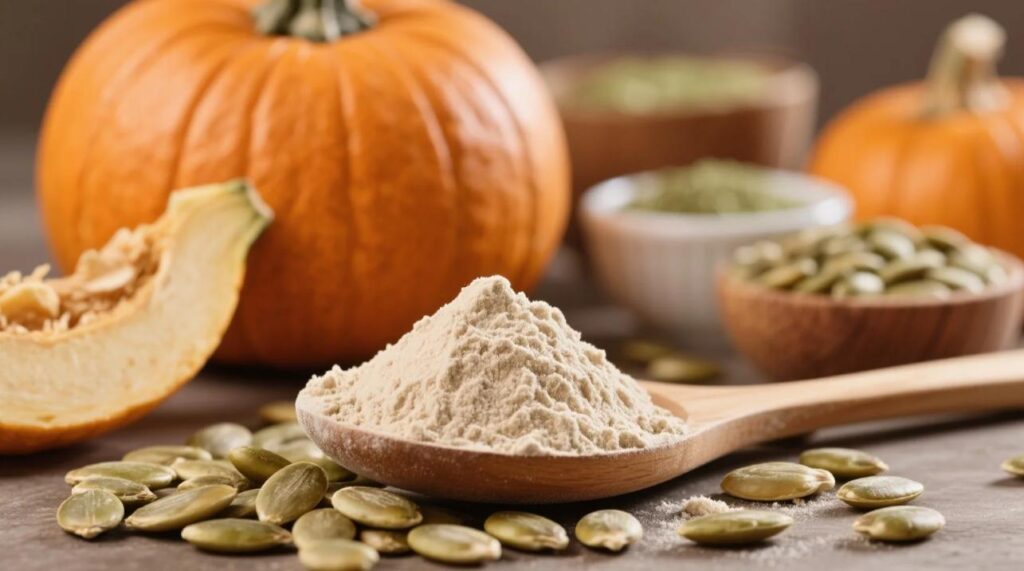Today’s consumers aren’t just looking for healthy food; they’re looking for sustainable food. As awareness grows about the environmental impact of our diets, brands that can offer nutritious, planet-friendly ingredients are gaining a significant edge. This is where organic pumpkin seed protein powder truly shines, emerging as a perfect fit for the burgeoning sustainable nutrition trend.
Moving beyond traditional protein sources, pumpkin seed protein offers a compelling narrative of ecological responsibility paired with excellent nutritional benefits.
1. Resource-Efficient Cultivation
One of the most significant environmental advantages of pumpkin seed protein lies in its origins:
- Less Land and Water Intensive: Compared to animal agriculture, which requires vast amounts of land and water, growing pumpkins is significantly less resource-intensive. Pumpkins can thrive in diverse climates and often require less irrigation than many other crops.
- Dual-Purpose Crop: Pumpkins are typically grown for their flesh (for food products like purées, pies, and livestock feed) as well as their seeds. This dual-purpose utilization means less waste and a more efficient use of agricultural resources. The protein powder is a valuable co-product from existing pumpkin farming.
2. Low Carbon Footprint
The journey from farm to consumer for plant-based proteins generally has a much lower carbon footprint than animal-derived proteins:
- Reduced Greenhouse Gas Emissions: Plant-based farming typically produces significantly fewer greenhouse gas emissions compared to livestock farming. By choosing organic pumpkin seed protein powder, brands contribute to a reduction in methane and nitrous oxide, potent greenhouse gases.
- Minimal Processing: The production of pumpkin seed protein powder usually involves simple mechanical processes (cleaning, de-shelling, cold-pressing to remove oil, and milling) that are less energy-intensive than the processes required for many animal proteins.
3. Biodiversity and Soil Health
Choosing organic pumpkin seed protein powder further enhances its sustainable profile:
- No Synthetic Pesticides or Fertilizers: Organic farming practices prohibit the use of harmful synthetic chemicals, which protects soil health, water quality, and biodiversity. Healthy soil is crucial for sustainable agriculture and carbon sequestration.
- Supports Polyculture: Integrating pumpkins into crop rotations can support soil health and biodiversity, contrasting with the monoculture practices often associated with large-scale industrial farming.
4. Allergen-Friendly and Clean Label Appeal
Beyond environmental benefits, pumpkin seed protein aligns perfectly with consumer desires for transparent and clean ingredients:
- Naturally Hypoallergenic: It’s free from common allergens like dairy, soy, gluten, and nuts, making it an inclusive option for a broad consumer base seeking “free-from” products. This simplifies ingredient lists and builds consumer trust.
- Recognizable Ingredient: “Pumpkin Seed Protein” is a clear, simple ingredient name that consumers recognize and feel good about, contributing to a strong clean label strategy.
5. Nutrient Density with a Conscience
Finally, sustainable nutrition doesn’t compromise on health benefits. Organic pumpkin seed protein powder delivers:
- Complete Protein: It offers a complete profile of essential amino acids for muscle health and satiety.
- Rich in Micronutrients: Packed with magnesium, zinc, iron, and antioxidants.
- Healthy Fats and Fiber: Contributing to overall well-being and digestive health.
By incorporating organic pumpkin seed protein powder into your product formulations, you’re not just adding a high-quality protein source; you’re making a powerful statement about your commitment to environmental responsibility and consumer well-being. It’s a strategic move that aligns your brand with the future of food, offering products that are good for people and good for the planet.
How will you leverage the sustainable power of pumpkin seed protein in your next offering?
Recommended Product
Organic Pumpkin Seed Protein Powder
Organic pumpkin seed protein powder offers ≥60% protein with unique sleep support, prostate health, and…

